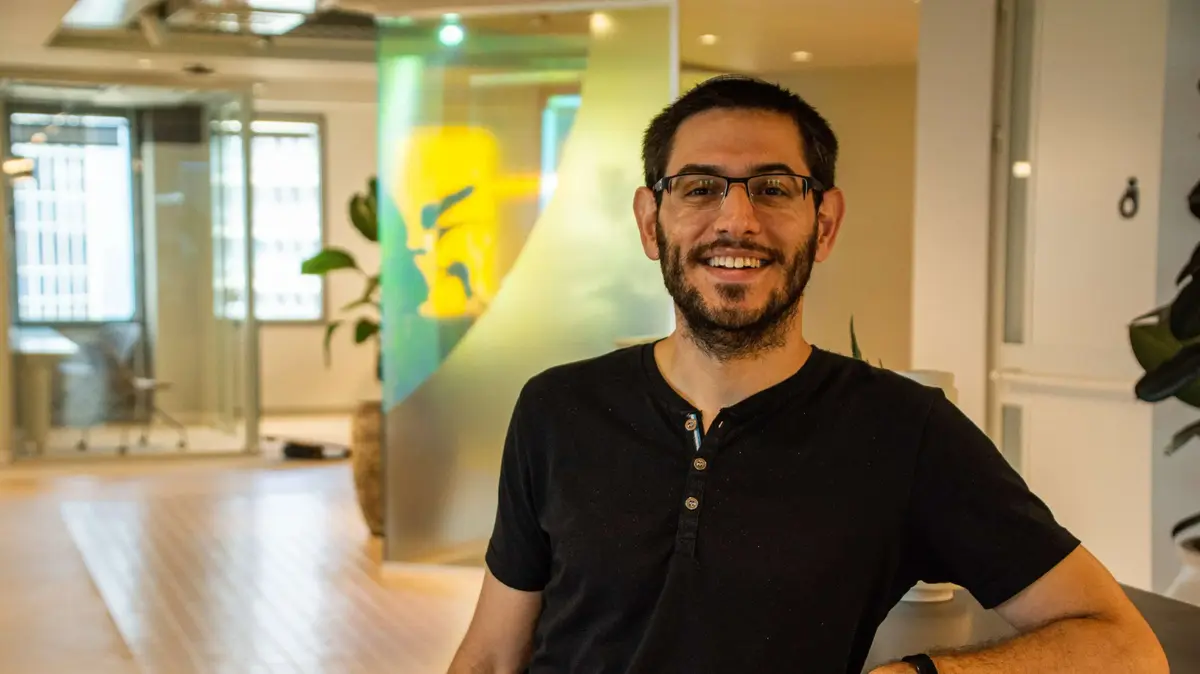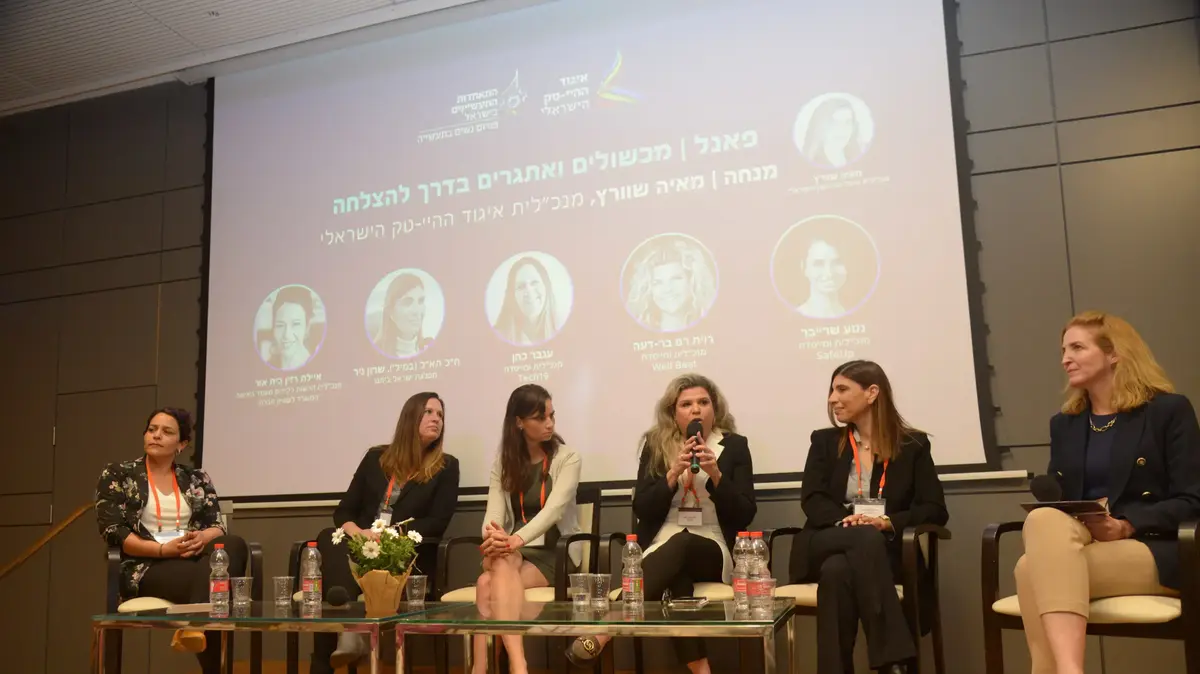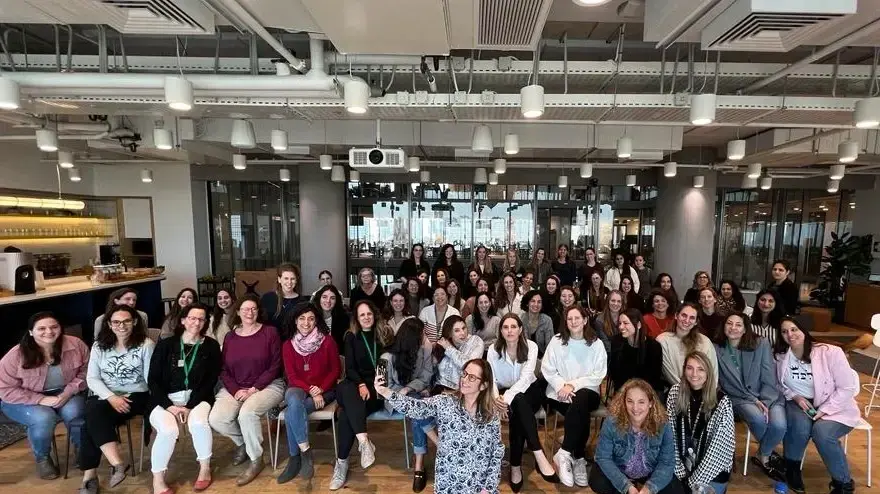Is unicorn kosher?
The high-tech that combines two opposing worlds
In the high-tech industry they talk about diversity, but the number of religious and ultra-Orthodox in the industry is still low.
Doron Greenzeig proves that it is possible to combine a commitment to a career with maintaining a religious lifestyle, and living in a settlement that most of his colleagues would not know how to place on the map.
And he also has an important message for the ultra-orthodox public
Talia Levin
08/18/2022
Thursday, August 18, 2022, 13:08 Updated: Friday, August 19, 2022, 08:37
Share on Facebook
Share on WhatsApp
Share on Twitter
Share by email
Share in general
Comments
Comments
Doron Greenzeig, Senior Tech Leader at Startup Island (Photo: Public Relations)
"On my first day at one of the workplaces, I attended a lecture about women in the high-tech industry," says Doron Greenzeig, Senior Tech Leader at Start-Up Island, which produces a secure corporate browser for companies.
"At the end of the lecture, I approached the lecturer and told her that as much as there are few women in the field, there are even fewer religious people in the high-tech fields. There were maybe two religious people on our entire floor. There is also an explanation as to why this happens."
Greenzeig explains that a very large part of the people who end up in the high-tech industry and start-ups start on a path through the military, "but most of the national religious people want to serve in the army, so they are less likely to go that route. There are also national religious people like me, who wanted to fight but did not fit in terms of medical profile, and they immediately go to the four years of sitting
It's impossible to get to these tracks if you start there, it's very difficult." Greenzeig's story (35) is relatively unusual in the usual landscape of a young man who leaves the army and becomes a soldier in the current Tel Aviv start-up, and he hopes that this interview will give a boost to other religious people who are attracted to the field , to reach and understand that it is possible to overcome the obstacles on the way and integrate successfully in the field even in a shorter route than they think.
With the dead at the "Island" offices (Photo: Public Relations)
Fixing computers since childhood
He is married + 5, lives in Move Horon.
A child from a religious family who grew up in Haifa, a completely normal childhood.
After graduating from high school with honors, mainly in the field of mathematics, he decided that he wanted to stop for a moment and think about whether the technical field really interested him.
"I wanted to be a combatant in the army and serve in the patrol of the General Staff," he says, but asthma prevented him from serving and before enlisting in the reserves he decided to study for four years at the "Torat Ha'im" yeshiva, which was founded in Neve Dekalim in Gush Katif and, following the disengagement plan, moved to Binyamin.
After his yeshiva studies, he enlisted in the army and was accepted into the Blue Shahar course - which allows ultra-Orthodox to acquire a profession and technological skills within the army, where he learned to program. He almost finished his bachelor's degree in computer science at the Open University, but according to him he realized - after many interviews - that a bachelor's degree is a waste of time , and managed to work in various high-tech companies thanks to his programming skills. "When I was a child I was the one who fixed the computers for everyone, at school if there was a problem with the computer the teacher would call me.
I really don't understand how I knew and how it happened, but today I see the skills of my 11-year-old eldest son and maybe I understand that it is simply something that exists there.
This is the reason why, at the end of my yeshiva studies, I thought of going in the direction of a reserve as well as engaging in the field in some form." And
at what stage of the degree do you realize that you are wasting your time?
"First of all, I had two children, which is already different. And I wouldn't really have been able to go to school because the service in the army was very demanding. I remember exams at the university that I would study for in the car right on the way to the exam. In the end, after the release, I was involved in all kinds of jobs and none They didn't ask if I had a degree and what my grades were.
I found out that in this world the degree is only of interest to the college and my mother. For example, in the previous company I worked for, there was no difference between an engineer who finished studying and an engineer who came with personal experience. In the end, colleges aim for one thing - for the master's degree, while they do not emphasize the professional experience and the practice, which is ultimately extremely important when you come to work in such positions, and I see this a lot in interviews."
"The majority of the religious public actually prefers to turn to teaching," says Greenzeig, "there is even a surplus while in the secular institutions there is a shortage. Here it is very difficult to find a job for teachers."
Is this a different pavement?
"I don't like the word peddling. I think it's a choice, people see their mission as educating and no one forced them. And regarding religious women, most of them prefer not to neglect raising children alongside work. And in the end, my message to those who do want to integrate It is that learning to program on your own is not a problem, all you need is the time, desire and references. There are many courses today whose level is no less than described. It is not personal in terms of jobs at all, and not even everyone knows, but there are many places that are willing to teach you in exchange for you committing to work With them later. Everything is possible, and it's just a desire to invest this time."
More in Walla!
Includes performances by Rita and Amir Dadon: the colorful festival you shouldn't miss
In collaboration with KKL-Junk
"I don't like the word paving."
Greenzeig (photo: Public Relations)
The best job in the world
Shortly after his release from the army, Greenzeig met Dan Amiga, a young emerging startup 8200, and the two worked together at Visalia, which was purchased by Schneider Electric in 2011. At some point, Dan decided to leave to found Fairglass, the start-up that later became his first exit.
While Greenzig chose not to join him, he had to watch from the sidelines the rapid success of the company, which within a few years was sold to the Symantec Corporation for $250 million.
After leaving Visalia, Greenzeig worked at several companies and managed to develop a great skill and knowledge in platform development and in the cloud field.
"I remember the hesitation I had about whether to join Dan or give up. In the end I decided to stay in Visalia. When they closed the company, the entire team dispersed and I found a dream job at Similar Web, I was responsible for the data, and I basically dealt with everything."
After a significant period in the company, Greenzeig heard that Dan Amiga is again establishing a new start-up after the successful exit.
"A few weeks before the company's IPO, Omri, who was my team leader, calls me and tells me that he is working with Dan and starting a new start-up. I refuse, of course, because I have the best job in the world, and he insists and tells me, 'But listen.' If it's good for me, I'm interested and I'm not leaving. I had a very good position in the company that I can't leave such a position and certainly not so close to the IPO."
In the end the bug tickled Greenzig who gave in and came to the meeting.
"It was already hard for me to say no, I realized that in Eiland they produce a product that will be the heart of the industry both in Israel and abroad."
And you did the thing that no startup before you dared to do - leave a few days before the IPO?
"Exactly. The CEO of the company came to me and told me you are not normal, you are in the best position in the company, and he was really right.
I was in the best position in the company.
And yes, I even lost quite a bit of money on paper.
It was at the stage of leaving a company that already has a price, and not for some start-up dream that you don't know if it will succeed.
Moreover, since this was Dan's second startup, there is always this saying that there is a syndrome of entrepreneurs who have succeeded and their second time completely crashes.
But I knew it would work and I was at peace with my very unusual decision."
About two years ago, Dan Amiga founded Island, a start-up that develops a secure browser for companies, and stunned the market when it reached a value of 1.3 billion dollars within a year.
This time, Greenzeig, who left his position as a senior engineer and team leader in the field of big data at Similar Web, became a Senior Tech Leader in the company.
"This is a position that combines management skills and technical knowledge," he explains.
Greenzeig is basically responsible for perfecting development processes and organizational processes without changing the organizational structure or adding another layer of management.
This is a role that is instead responsible for the success and impact of the entire project that is being worked on.
In simple words, he is the Kambatz of the technological event.
live and let live
It is strange that in 2022 we are referring to these things, but we can say that your presence in the Tel Aviv offices of Island is, how to say, unusual?
"I live in a town where most of my colleagues don't really know where it is, I make sure to pray three times a day even when work in the office goes on into the night, I observe Shabbat, but in this context the responsibility is also mine, I feel that I have to give added value and be the best I can."
I understand that they keep a kosher kitchen for you
"I believe in the animal and let it live. I am against affirmative action and this is something that is important to me to say, whether it is in front of women or whether it is in front of religious people. I am in a company and in every company I have been because I was the best they could find, and I do think that this is an important starting point for all employee. He knew he was there because he was good in his field and not because he came to fill a quota. On the other hand, I think it is important to increase diversity mainly to prove that integration is possible. Getting to know the other is important to Israeli society in general. Core studies are not always as important as the desire to succeed, and thinking Critically, which, by the way, is something I learned in yeshiva, and it's also an advantage I see in many yeshiva graduates."
What is meant by?
"The yeshiva world brings slightly different people to the worlds of employment and not necessarily to high-tech. The yeshiva I studied in was a bit unique in its landscape and the concept of criticality was very prominent in it. This is an attitude that greatly contributed to me in the industry. Not to accept anything as an absolute truth, but to investigate and reach the truth on your own, even when there is The halacha has already ruled. I know that these things also exist in yeshiva in general, to learn a lot and to test. And the ability to learn and examine things is a very required quality in this professional world. Someone once told me, 'You are used to studying, you will manage,' and it is true."
And you can't do without a somewhat defiant question, "from Gush Katif to the heart of Tel Aviv", how were you received?
"I think this combination is very healthy, getting to know each other. There are people who are exposed to people "like me" for the first time. I never try to convince and truly believe that a person in his faith and way of life will live. This is the only approach that can save Israeli society.
I think that workplaces that try to push the agenda of one side to the other are making a mistake, and at the very beginning of my career I already encountered such a thing and stayed there for exactly two months.
And the secret to success is that the company understands that everyone has a common goal that the business will eventually succeed and that's what's important."
Of money
Tags
start up
High tech
religious















